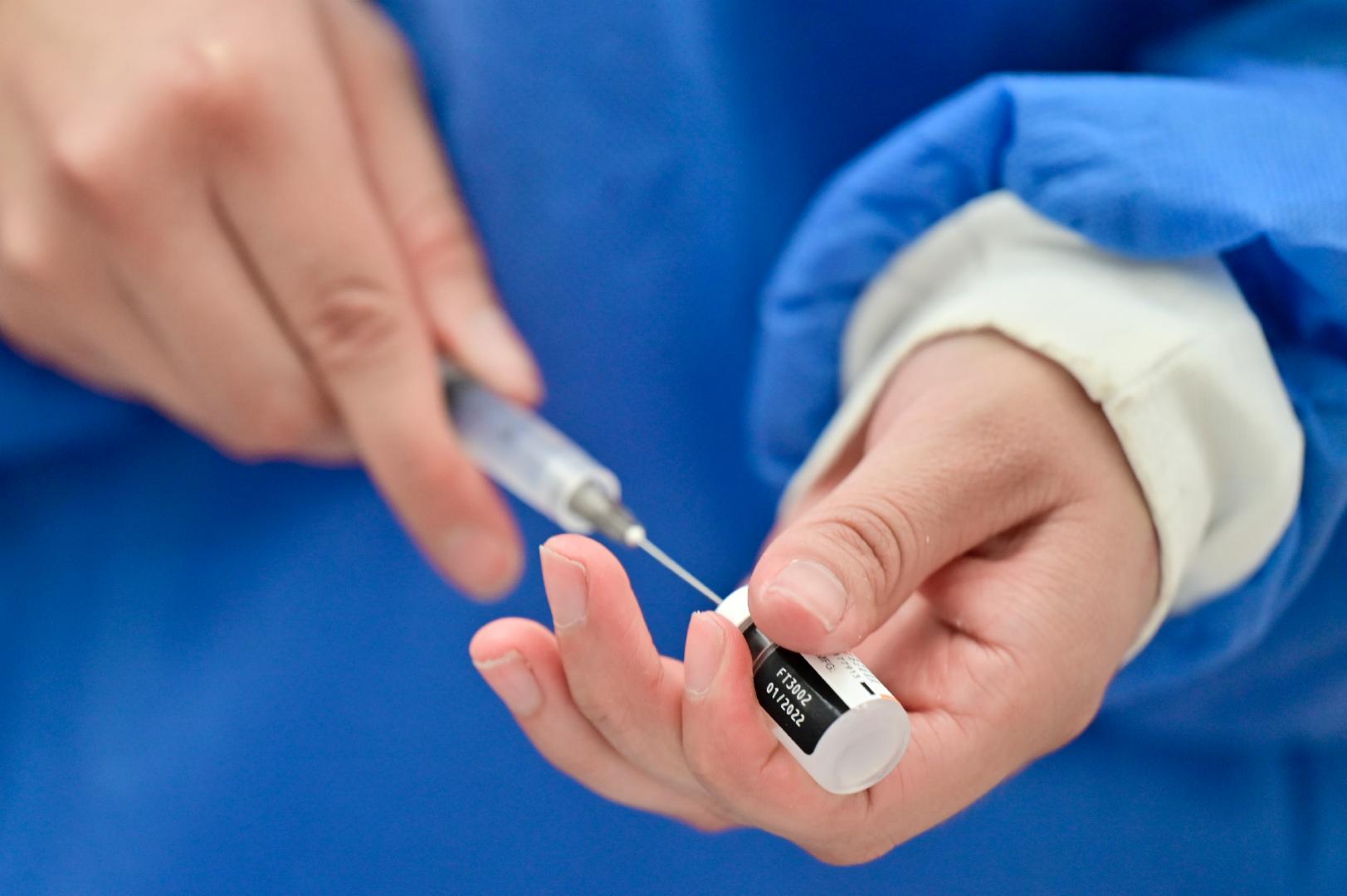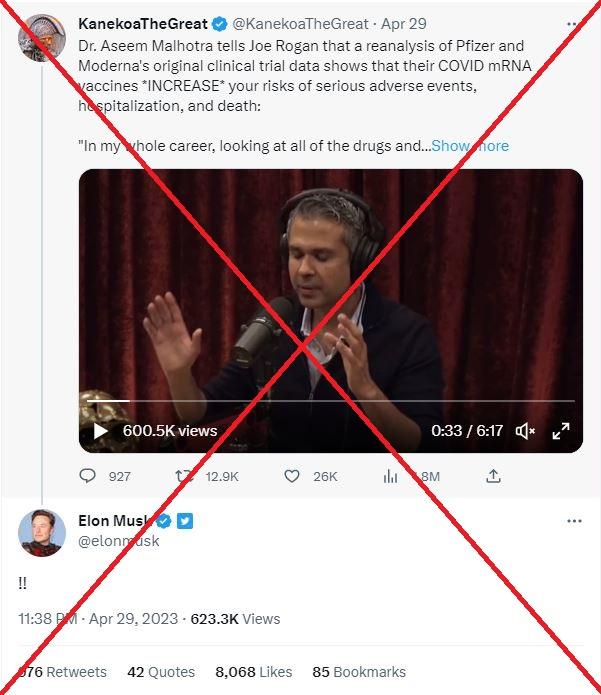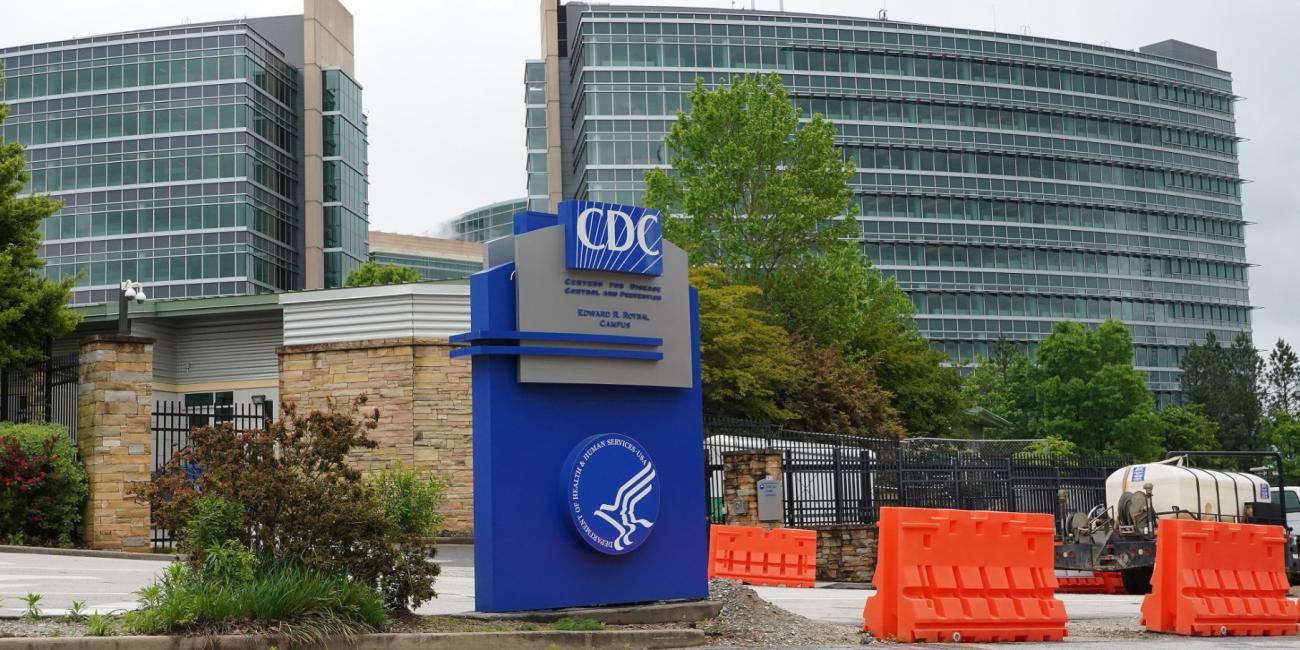
British cardiologist misleads on Covid vaccine risk
- This article is more than two years old.
- Published on May 5, 2023 at 16:54
- 6 min read
- By Daniel FUNKE, AFP USA
"In the trials that led to the approval by the regulators ... you were more likely to suffer a serious adverse event from taking the vaccine -- hospitalization, disability, life-changing event -- than you were to be hospitalized with Covid," Malhotra said during an April 29, 2023 episode of "The Joe Rogan Experience," the most popular podcast on Spotify.
"So what that means is it's highly likely this mRNA vaccine should never have been approved for a single human in the first place."
Clips from Malhotra's appearance circulated across Facebook, Instagram and Twitter, accumulating thousands of interactions. One tweet from a supporter of the baseless QAnon conspiracy theory received more than 12,000 shares.
Twitter owner Elon Musk amplified the narrative to his 138 million followers by replying: "!!"

Malhotra has previously spread misinformation about Covid-19 vaccines, falsely claiming the shots pose a greater threat than the virus itself. In January, the BBC was criticized for allowing him to link the shots to excess cardiovascular deaths in the United Kingdom.
Malhotra made similar allegations during his interview with Rogan, who has interviewed other anti-vaccine advocates on his show. The doctor claimed research shows messenger RNA (mRNA) vaccines from Pfizer-BioNTech and Moderna are associated with an increased risk of heart attack.
But medical experts and public health authorities say a broader body of data impugns Malhotra's assertions, showing vaccination is safe and effective at preventing severe illness, hospitalization and death due to Covid-19.
"While there are known side effects of Covid vaccines, the data unequivocally supports the notion that the risk-benefit calculation favors the vaccine in all populations," said Amesh Adalja, a senior scholar at the Johns Hopkins Center for Health Security, in a May 2 email. "Often purveyors of this information take data out of context, make unjustified conclusions and use faulty data to discredit a vaccine that has saved countless lives."
AFP reached out to Malhotra for comment, but a response was not forthcoming.
Adverse events
As evidence for his claim about Covid-19 vaccine side effects, Malhotra cites a September 2022 paper (archived here) published in the peer-reviewed journal Vaccine.
Researchers from the United States, Spain and Australia analyzed data from the clinical trials for Pfizer and Moderna's Covid-19 vaccines. Instead of focusing on all potential side effects, they isolated a "priority list of Covid-19 adverse events of special interest" (archived here) -- including conditions ranging from acute respiratory distress syndrome to loss of smell -- from the Brighton Collaboration, a global research network focusing on vaccine safety.
The study says there was a "16 percent higher risk of serious adverse events" among vaccine recipients than among those who did not receive the shots, pointing to a "need for formal harm-benefit analyses."
But Larry Corey, a professor in the Vaccine and Infectious Disease Division at the Fred Hutchinson Cancer Center, said in a May 2 email that, "within the context of the (US government)-supported clinical trials on Covid-19 vaccines, we have no evidence of subsequent high rates of hospitalization or cardiac events post-enrollment into these trials."
The Vaccine paper authors note their research "was not designed to evaluate the overall harm-benefit of vaccination programs so far" and that it "does not consider data on post-authorization vaccination program impact."
Adalja said the study "has to be interpreted in light of the fact that billions of doses of the vaccine have been given." The US Centers for Disease Control and Prevention (CDC) says on its website (archived here) that verified reports of adverse events are rare; for example, anaphylaxis occurs in approximately five cases per one million doses administered.
Pfizer told AFP in a May 1 email that "serious adverse events that are unrelated to the vaccine are unfortunately likely to occur at a similar rate as they would in the general population."
AFP reached out to Moderna, the Brighton Collaboration and the US Food and Drug Administration for comment, but responses were not forthcoming.
Heart attacks
In his interview on "The Joe Rogan Experience," Malhotra also mentions an abstract (archived here) published November 8, 2021 in the journal Circulation. AFP has previously fact-checked claims in the research summary.
Using the PULS Cardiac Test, a blood test designed to detect signs of heart disease in otherwise healthy people, American physician Steven Gundry tracked inflammation levels in vaccinated patients.
"What he found was that within eight to 10 weeks of these patients taking the Moderna or Pfizer vaccine ... their risk of a heart attack went from 11 percent at five years -- just within two months -- to 25 percent," Malhotra told Rogan.
However, an expression of concern (archived here) published November 24, 2021 highlighted several problems with the abstract. The study contained errors, relied on "anecdotal data" and had "no statistical analyses for significance," the notice says.
Nearly a month later, Gundry -- who promotes pseudoscientific diets -- corrected his abstract to note the findings were observational and that the data on acute coronary syndrome risk "has not been validated in this population."
Laura Gorr, a spokeswoman for the American Heart Association -- the nonprofit group that publishes Circulation -- said in a May 3 email: "There is no published work that accurately claims that vaccines have demonstrated to increase heart attack risk." She pointed to an April 2023 paper (archived here) that found no risk of out-of-hospital cardiac arrest due to Covid-19 vaccines.
Martha Sharan, a spokesperson for the CDC, confirmed that in a May 1 email.
"To date, no evidence indicates that Covid-19 vaccines predispose recipients to heart attacks," she said.
The CDC is monitoring some "adverse events of interest" (archived here) reported after Covid-19 vaccination -- including heart conditions such as myocarditis and pericarditis. But such ailments are far more common following Covid-19 infection.
"Myocarditis and pericarditis after Covid-19 vaccination are rare," said Belsie Gonzalez, a CDC spokesperson, noting in a May 1 email that most cases are in young men and boys who have received the Pfizer or Moderna vaccines.
Of the tens of millions of doses administered to children and adolescents in the US, there have been fewer than 800 verified reports of myocarditis following vaccination, according to data from the CDC (archived here).
Hospitalization
Malhotra argues people have a greater risk of serious adverse events resulting from Covid-19 vaccination than of being hospitalized with the virus itself. But public health data and experts indicate that is not true for most people.
In February 2023, hospitalizations due to Covid-19 were more than 10 times higher among unvaccinated people than among adults who had received a dose of the bivalent booster, according to the CDC's Covid Data Tracker (archived here). The Commonwealth Fund, a private US foundation that aims to improve health care quality, estimated the shots prevented more than 18.5 million hospitalizations between December 2020 and November 2022.
However, individual risk is variable -- it depends on factors such as age, sex, ethnicity, preexisting conditions and vaccination status.
For example, Americans aged 85 and older are 15 times more likely to be hospitalized with Covid-19 than those 18-29, according to CDC data (archived here). Children are less likely to be hospitalized.
"It is important to recognize that every vaccine has a risk-benefit trade-off, and with Covid-19 not everyone has a risk for hospitalization," said Adalja of Johns Hopkins.
Still, the CDC recommends everyone aged six and older receive one bivalent vaccine -- which includes a component of the omicron variant -- from Pfizer or Moderna. People 65 and older should get two, while those who are immunocompromised may need more doses, the agency says on its website (archived here).
"Vaccination remains the safest strategy for avoiding hospitalizations, long-term health outcomes and death," said Sharan of the CDC.
AFP has fact-checked other false and misleading claims about vaccines here.
Copyright © AFP 2017-2026. Any commercial use of this content requires a subscription. Click here to find out more.
Is there content that you would like AFP to fact-check? Get in touch.
Contact us




